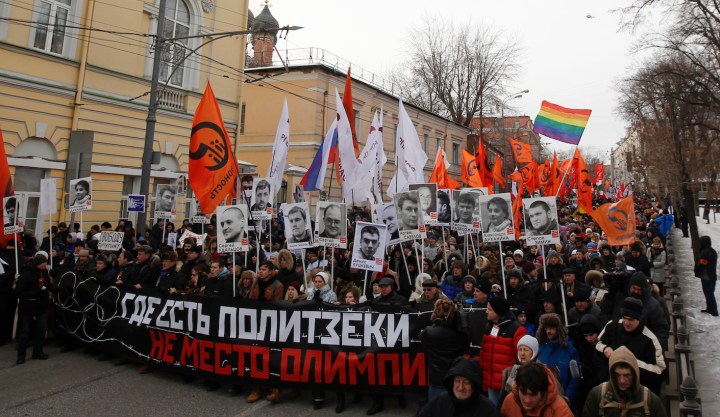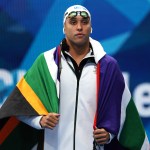Sport
Media censorship: What Russia doesn’t want you to know about the Sochi Games

It’s not just Russia’s homophobic attitude attracting headlines in the lead-up to the Winter Olympics. Reports of corruption, environmental damage, mistreatment of construction workers, the displacement of families and more are casting a shadow over the upcoming Games. And Russia doesn’t want you to know, so it’s silencing reporters instead. By ANTOINETTE MULLER.
On Thursday, the Winter Olympics will kick off in Russia under the curious eye of millions of observers. Not only is the way the Russian government treats and views gay people questionable, but there are several other factors that have caused furrowed brows.
Corruption, secrecy and money being pocketed by the wrong people are all issues that have rendered this Winter Olympics one of the most dubious events in history of the Games. There is much the Russian government is trying to hide and those reporters who have braved trying to expose the truth have been threatened, arrested or censored by security.
So, what is it that the Russian government does not wanpert you to know about its hosting of the Games? Here’s a brief look.
To start with, Vladimir Putin is sending construction to his cronies
The name Arkady Rotenburg probably means nothing to you, but he and Mr Putin go way back. The two have been friends since school and the bulk of construction products for the Games have been contracted to him. Rotenberg is big in construction, so big that five of his companies were contracted to 20 different locations in Sochi. Everything from roads to media centres have been pawned off to Mr. Rotenberg and it’s estimated that around 15% of the Olympic budget has gone to him.
Money is going to all the wrong places
Vladimir Yakunin is another friend and an ex-business partner of Putin’s. He’s also happens to be the head of Russian Railways and is the man behind the most expensive bit of construction for the Olympics. The road between Alder and Krasnaya Polyana cost $8 million to construct. Reportedly, the money came from the state budget which in turn resulted in raised rail tariffs. But that’s not where it ends. One of the venues, the Bolshoy Ice Dome, cost $300 million, or $25,200 per seat (12 000 seats in total), more than twice what it should have cost. The total bill for the Olympics is around $50 billion, which is five times more than the cost of Vancouver winter Olympics. Valery Morozov, an ex-Olympic contractor, believes that a large portion of the money went towards kickbacks and payoffs. Morozov is currently living in asylum in England after disovering that a contract had been taken out for his assassination. During his time as a contractor he was told to add $30 million to his bill and then reroute this money back to those officials through phantom companies.
The mistreatment of construction workers
Abuse, appalling working conditions and not being paid are just some of the injustices those who worked on getting the venues together have suffered. Many workers have reported that their wages have gone unpaid. Last year, a worker went so far as to sew his mouth shut in protest. In December 2013, an investigation found that employees were owed around 277 million rubles (US$8.34 million). There are also reports of migrant workers having their passports confiscated and being forced to work 12 hours a day with just one day off per month. Martiros Demerchyan, an ex-construction worker, also reported how he was brutalised by police for being told he was forced to sign a confession for a crime he never committed.
A curb on press freedom
Øystein Bogen, foreign affairs correspondent for TV2 in Norway, and his crew were detained and arrested while reporting on the controversies of the Olympics. A paper for which Olga Allenova worked was sent several threatening letters and told to stop reporting on the dark side of the Games or “there would be serious problems”. Her editor was eventually fired and she was removed from Sochi coverage. Nikolai Yarst, a Sochi journalist, was arrested on drug charges last year while investigating corruption. He claimed the bust was a setup. When the BBC’s Panorama went to investigate the environmental impact on a village, their researcher was stopped by police and the camera crew informed they could not film or enter the village they wanted to, despite the fact that they had permits to film. Almost every single journalist who has continuously covered the truth behind the Games has been threatened, harassed or, at worst, arrested. There are also reports of the state trying to actively sensor coverage. The local Internet portal Blogsochi, which cites the government website Zakupki (Purchases), said that from December 2012 to March 213, Sochi spent 32,628,600 rubles (US$988,778) from its budget to 17 different media houses. What the funds were handed out for is not clear but many reporters have said that it is common place for money to be handed to Sochi media in order for content to be censored. Sochi city administration hand out this money and can do anything from reviewing content before it is published to banning certain articles or even suggesting that facts are glossed over.
The environmental impact and the treatment of residents
Some environmental experts suggest that the construction of the high speed railway as well as a new road has caused damaged to Sochi’s Mzymta River. Much of the construction has also caused damaged to the Sochi National Park. Everything from dumping illegal waste as well as the construction of power lines has caused landslides which have resulted the sinking of or partial collapse of homes. Water supply to a village has been cut off, resulting in the drinking wells having no running water. Families have also been displaced, with the Khlistov family being just one such case. Their home was expropriated for Olympic construction without compensation. Other environmental damage includes territories of the Western Caucasus UNESCO World Heritage site having been removed from World Heritage protection and mining of crushed stone in the Sochi National Park.
It is unclear how this repression, described as the worst since the collapse of the Soviet Union, will affect coverage and attendance at the Games. Activists have encouraged global journalists and athletes to familiarise themselves with the political conditions in Russia and to participate in campaigns to highlight these. DM
Photo People march during an opposition rally in Moscow on February 2, 2014. Protesters demanded the release of political prisoners including anti-government activists detained in Moscow’s Bolotnaya Square on May 6, 2012, the eve of President Vladimir Putin’s inauguration. The banner reads “The place where there are political prisoners, is not for the Olympics”. (REUTERS/Maxim Shemetov)



















 Become an Insider
Become an Insider